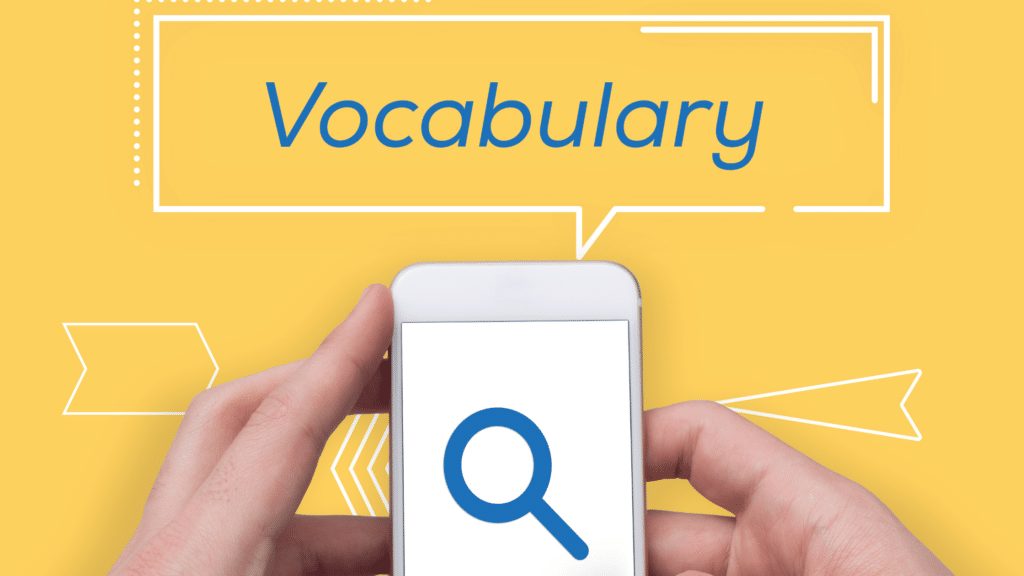
7 Ways to Improve Your Vocabulary
Question: If you are a language learner, have you ever felt discouraged or demotivated in your process of learning? Have you ever thought “Why isn’t my _____ (insert language here) better? Have you been learning a language for a while, then tried to watch a show on Netflix in that language and understood a lot less than you thought? You are not alone!
Language courses are often centered around grammar. Each language has specific rules, so naturally, it is important to master them. But another huge (HUGE!) part in learning a language is vocabulary. You might say: “yes, we know!” but you may underestimate the importance of learning vocabulary.

For those of you who are not learning German, look at these three words:
der Bericht (the report), der Mann (the man), schreiben (to write) One verb, two nouns.
Not knowing any grammatical rules about the German language, but having just learned these three words, do you think you will be able to translate this sentence:
“Der Mann schreibt den Bericht.”
You might very well be able to. For those of you who are, in fact, learning German, you might be able to detect that there is an accusative noun in this sentence, and you might be able to conjugate the verb “schreiben”, but if you don’t know what these words mean, then what good is it to know the accusative?
One could almost say that learning vocabulary will get you farther than knowing only the grammar (of course, you need both.) but looking at the above example, it becomes clear: vocabulary is very important, and you should spend just as much time learning vocabulary than you are learning grammatical charts, verb endings or tenses.

But finding relevant vocabulary can be a bit tricky. Many language textbooks are themed, and you will mostly find vocabulary lists to help you understand the material in the book, which is great! But you can do so much more.
What do we mean “relevant”? Say you are working at a specific department of your company, or you are studying a specific subject at school, or you are preparing for a trip. Every learner has a different reason to be learning a language, so how do you keep the vocabulary relevant, and how do you make learning vocabulary fun and engaging? Follow these 7 ways to improve your vocabulary.

1. Make lists.
Make lists? That’s boring! Well, it doesn’t have to be. Next time you go grocery shopping, and you find yourself making a list, look up the words in the language you are learning. Note: If you are learning a language with gendered nouns, look up their gender and their plural spelling. Next time you are cooking or baking off a recipe? Look up the words you don’t know in your target language. There are several index-card-apps, that you can use to quiz yourself later. Or keep a little vocabulary book in your kitchen or in your car. Make lists and look up words that are relevant to you and your daily life!

2. Read.
Read as many books, magazines and newspaper articles in your target language as you can. The beauty with reading is, you can read books that you are interested in, or that seem interesting to you. Don’t know a word? Look it up and write it down. Not only are you seeing a very authentic use of the word, but you also see it used within context. Again, look up the gender of the noun and its plural spelling. If it’s a verb, look up its conjugation as well. But most importantly: write it down!

3. Watch movies with subtitles.
Netflix has increased their international movie selection dramatically, and most of them let you watch the movie in their original language with subtitles on. Do not worry if you don’t understand everything if the subtitles aren’t on. Sometimes the background noise is loud, sometimes the actors mumble or have accents. Turn on subtitles, and (you guessed it) write down words you don’t know. Write them down in your vocabulary book, or put it into your phone.

4. Listen to music.
Look up artists that write music (or poems) in the language you are learning. Chances are you will find new music that you like, and they are a great source of vocabulary, which you will (of course) write down into your little vocabulary book. Listening to music exposes you to a more poetic use of the language as well, which is great.

5. Watch interviews.
YouTube is full of interviews. Find a channel that posts videos of interviews in your target language (ideally with subtitles). Many learning channels post videos of street surveys, which is a wonderful way of hearing natives speak (or mumble or slur), and they are a great source of vocabulary. You can also watch interviews with famous people from the country (soccer stars, musicians, politicians, etc.). This way you will learn about the culture as well.

6. Read jokes.
Looking up jokes in your target sentence is, you guessed it, a great source of vocabulary. But additionally, you will expose yourself to idiomatic speech and puns, which are an ultimate test to your language skills. Understanding a pun can be a challenge even to a native speaker. If you are a learner, there is no harm in looking up the meaning of a word to try to understand a pun.

7. Practice, Practice, Practice.
Writing down words you don’t know is only part of the exercise. You have to go back and practice all that vocabulary that you are writing down. Index cards are a wonderful way to do that, as well as apps such as Quizlet. Test yourself as much as you can. If you don’t know a word, repeat it a few times, then leave it and come back to it.

If you follow just half of the suggestions above, you will see how fast your vocabulary will be expanding, and thus your comprehension of the language. If you have another idea, feel free to share in the comments below!
If you would like the help of a professional to further expand your vocabulary. Visit our shop.





Responses